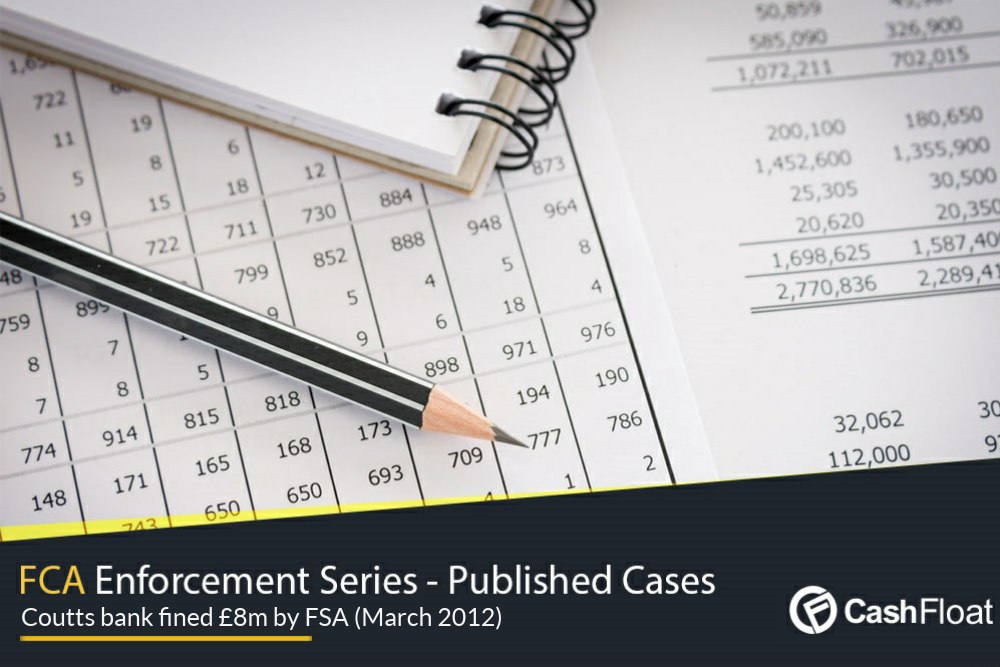Cashfloat investigates the next chapter of its UK misconduct series in this article about how Coutts bank was fined by the FSA in 2012. Cashfloat is a Uk small loans lender that is fully authorised and regulated by the FCA.

The FSA’s New Regulations
Over the last few years, the Financial Services Authority has been implementing new regulations. They have also performed investigations in a wide range of different industries. Their work in the short term loans market has ensured that people in need of extra finance now find it easier to locate a responsible lender. Up until the FSA got involved, some firms within the industry operated in somewhat of a wild west manner. There was no cap on interest rates and the companies concerned of failing to offer affordable cash.
Without the FSA’s involvement, it would have been almost impossible for anyone seeking finance to identify an affordable lender. Thankfully, things have moved forward since those days, and now the industry is operating at a more acceptable level. Even so, it’s the FSA’s work in the banking world that seems to be making headlines around the world.

The FSA and Coutts Bank
After a long investigation, it was deemed that Coutts bank had failed to establish suitable anti-money laundering systems. They also failed to implement controls for high-risk customers. Visits were made to Coutts bank in 2010 in an attempt to review the bank’s strategies for dealing with money laundering. The investigators in charge of the case found that serious failings were made of a systematic nature. That was especially true when it came to their approach to controlling high-risk clients. The FDA found that Coutts failed in almost three-quarters of the files reviewed.
Banks have an obligation to ensure they are not facilitating criminal or terrorist activities, but processes were not in place to ensure that happen. The banking giant should have sought accurate information about the wealth of their clients. However, they continued to accept money and do business with people who were not properly assessed. It is expected that all high-risk clients should have the source of their wealth examined, but Coutts bank didn’t seem to care about it. They didn’t even scrutinise hefty transactions that should have set alarm bells ringing.
The FSA’s Response
The FSA’s acting director of enforcement and crime released a statement saying the failings were significant. She went on to state the conduct of Coutts fell below that which she would expect to see from such an established brand. The fine, in her opinion, represented how seriously the FSA had taken the failings.
The statement continued:“The penalty should serve as a stern warning to other firms. They must review and adapt their controls to changing financial crime risks within their businesses. They must also make changes to reflect alterations in regulations and legal standards.”
Released information suggests the fine could have been as high as £12.5 million if the bank hadn’t agreed to settle the dispute during its early stages. Some experts feel that allowing reductions of that nature simply encourages other institutions to hold their hands up. They don’t, however, encourage them to abide by regulations. It’s important to remember that Coutta failures could have helped them to make profits far higher than the fine issued. That means they still win, even after coughing up around £8 million.

Who are Coutts Bank?
Coutts is one of the oldest private banks in the world. First launched in 1692, it fast became the institution of choice for some of the richest members of our society. Indeed, even the Queen held an account at the time of the FSA investigation. The Royal Bank of Scotland group acquired Coutts bank in 2000 when they purchased NatWest. Ever since then, there are been numerous failings reported in the press. As their headquarters are in London, the Financial Services Authority had no trouble locating the evidence they required for this case.
After all the hard work undertaken by the regulator, many industry experts feel that more must be done to limit the chances of other companies using the same slack tactics. The main issue faced by the FSA relates to the fact that all their funding comes from fines and sanctions. While an injection of government funds might help them to expand operations and investigate more cases, that is unlikely to happen anytime soon. The UK government insists that keeping the FSA as an independent body is the best way to avoid corruption.
While the fine of £8 million is by far the largest issued in a case involving anti-money laundering practices, it is a long way from solving the problem. If a bank can make hundreds of millions of pounds by acting in a fraudulent manner, will a fine at that level make much difference? It certainly doesn’t serve as motivation to clean up their act. Most people would agree that fines placed in companies in that position should accurately represent the amount of profit gained.
The situation is made even worse when you consider that 82% of RBS is owned by the taxpayer. That means it is almost a public company. So, it is certainly in the public interest to expose and rectify any wrongdoing.
Summary
The chief executive of Royal Bank of Scotland released a statement to the public relating to the current issue. He said the banking group was disappointed that Coutts bank failed to meet the FSA’s standards. Especially when implementing anti-money laundering controls. He went on to state that RBS is committed to ensuring systems for dealing with financial crime are as robust as possible in every area of their business.
Will the fine act as a deterrent and stop other banking groups from failing the public? It looks like it could be a long time before we see a vast improvement in the industry. However, there is no doubt the FSA investigators are doing the best job possible with the resources at their disposal. Are there still significant changes and improvements that could help to clean up the industry? Almost certainly. We have to remember the FSA have a hard job. Investigating the actions taken by banks and other financial institutions involves a huge amount of industry expertise. Hopefully, the tides should begin to change as we move forward and more big businesses realise they are not above the rest of us.

